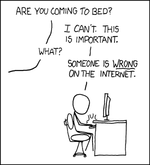Marvin Edwards
Veteran Member
... If you must necessarily order Steak at dinner in the restaurant on Main street at 8 pm, there is no choice in the matter, you go to the restaurant on Main street and you order steak at 8pm.
If someone has a gun to my head and tells me I must order steak at the restaurant at 8pm, then I have no choice.
But if I decide on my own to go to the restaurant, and then I choose to order the steak instead of the salad, then that is literally a choice, and it is literally a choice of my own free will (free of coercion and undue influence).
Reliable cause and effect, in itself, is neither coercive nor undue. It does not force us to do anything against our will, because it is the very source of our will. Choosing is the deterministic causal mechanism that sets our will upon a specific goal, such as having steak for dinner.
You are still conflating what is generally possible with what must necessarily happen in any given instance as the system evolves from prior to present and future states without deviation.
Ironically, it is you, not me, that is still conflating what is generally possible with what must necessarily happen in any given instance. I am saying it is possible for me to order the salad and it is also possible for me to order the steak. That's two possibilities. Only one of these two possibilities must necessarily happen at the restaurant. So, I'm the one that is avoiding conflating multiple possibilities with the single necessity. You are the one insisting that there is only one possibility, by conflating possibility with necessity.
What can generally happen is not the same as what must necessarily happen in any given instance in time.
That's what I've been saying!
All events, including our choices, were causally necessary from any prior point in time. And they all proceeded without deviation from the Big Bang to this moment. This includes us opening the menu, considering the many things that we can order, and choosing from them what we will order for dinner.
It makes no sense to claim that what we just did could not have happened, when it necessarily had to happen, exactly like it did happen.
As all events within a deterministic system are causally necessary, they are never choices.
That's the claim that has no merit. You see:
A. If ALL events within a deterministic system are causally necessary,
AND
B. SOME events are choices,
THEN
C. SOME events within a deterministic system are causally necessary choices.
These choosing events are unavoidable, inevitable, and must proceed without deviation, exactly as they do proceed.
If you must do something, and you have no alternate action (events proceed without deviation), that is not choice.
Events proceeding without deviation will necessarily include us opening the menu, considering more than one possibility, and choosing to order one of those possibilities for dinner.
Initial state delivers output without variation.
In a way, yes. But actually, the initial state only delivers the next state, and that state delivers the next, and so on ad infinitum. We cannot rationally say that the Big Bang ordered and delivered the steak dinner to my table. I did the ordering and the Waiter did the delivering. That's the only reasonable way to view the event. And that's how reasonable people normally view it.
And there is no way that the Big Bang is going to pay my dinner bill. That's my responsibility.
Rewind and play the system over and over and each and every action will be precisely the same.
Correct! Every time we rewind and play the system over, we will open the menu, consider our options, and choose for ourselves what we will order for dinner, free of coercion and undue influence (aka "of our own free will"). So, a choice of our own free will shows up every time in the replay.
What Does Deterministic System Mean?
''A deterministic system is a system in which a given initial state or condition will always produce the same results. There is no randomness or variation in the ways that inputs get delivered as outputs.''
Is that choice? ...
Yes indeed. Opening the menu, considering our options, and choosing what we will have for dinner is obviously a choice! And the fact that it was causally necessary to happen exactly like that, does not change the fact that it was a choice!

